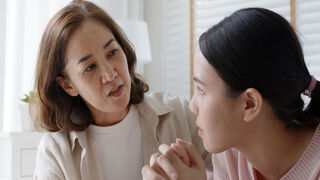
Ex-Intimate Stalkers: When Desire Becomes Dangerous
The truth about “stranger” vs. “ex-intimate” stalkers. KEY POINTS Ex-intimates are the largest subgroup stalked compared to strangers or


In the wake of the Supreme Court’s reversal of the Roe vs. Wade decision, making abortion difficult or impossible to get in many states, preventing unplanned, unwanted pregnancies in all age groups has become more important than ever. Teenagers, especially, need to be more aware of the risks of unprotected sex and other important facts in order to make responsible choices. Ideally, the best people to educate them are their loving parents.
This may not be easy.
Loving concern may make you feel like saying, “Don’t! Just don’t!”
But that’s not enough these days. Like it or not, components of sex education are all around us—some helpful, some not. Teens are influenced by what they see in movies and on television and what they hear from friends and also what their parents don’t say as much as what they do say.
In a recent therapy session, a young adult woman who had two unplanned pregnancies before she was 18 told me, “I wish my mom had been able to tell me the correct facts and how to make a healthy decision about when and whether to have sex. She probably was embarrassed or thought I wouldn’t listen. But the truth is, It could have made such a difference.”
How can you make a difference to your own adolescent?
By taking a deep breath and exploring all aspects of sexuality with him, her, or them. This doesn’t mean an excruciating one-time big talk, but a series of discussions, sometimes in reaction to something you’ve both seen in a movie or read in a newspaper or online, sometimes in answer to a question or a sharing of what you think about a topic, or sometimes as a means of learning something together.
A good sex education includes the following:
Kathy McCoy, Ph.D. is psychotherapist, journalist, and speaker and the author of books including We Don’t Talk Anymore: Healing After Parents and Their Adult Children Become Estranged.
The articles on Fitnesshacksforlife.org website is provided for reference purposes only, A public resource you can use for free. You should not take them as the sole source of medical direction. Fitnesshacksforlife.org does not accept payments or incentives from any of the individuals or organizations named in the articles, and the articles are not an endorsement of those parties or their products or practices. Do not ever disregard professional psychological or medical advice nor delay in any manner seeking professional advice or treatment because of something you have read on our site or social media. Fitness Hacks For Life is a registered 501(c)(3) non-profit organization, eligible to receive donations under the laws of the United States of America.

The truth about “stranger” vs. “ex-intimate” stalkers. KEY POINTS Ex-intimates are the largest subgroup stalked compared to strangers or

Many icks, on reflection, are just harmless “nicks.” THE BASICS Why Relationships Matter Take our Relationship Satisfaction Test Find a

You married a man who has not yet separated emotionally from his mother. How can you tell? One very obvious
If you feel suicidal, call or text the helpline: 988
Copyright © 2025 Fitnesshacksforlife.org | All rights Reserved | 501(c)(3)
400 NW Gilman Blvd.#787 Issaquah, WA 98027

Agreed Declined